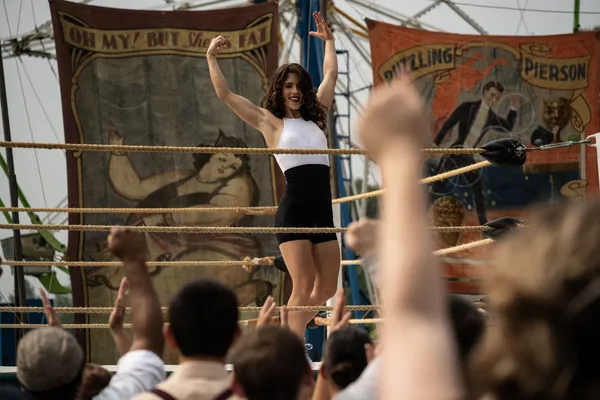 |
| Queen Of The Ring |
Ash Avildsen's Queen Of The Ring, based on Jeff Leen's 2009 biography, Queen Of The Ring: Sex, Muscles, Diamonds, And The Making Of An American Legend, is based on the real-life story of pioneering female wrestler, Mildred Burke, played by Emily Bett Rickards.
Unfortunately for ambitious single-mother Mildred Burke, women's wrestling is illegal across the United States. When she persuades wrestling heel Billy Wolfe (Josh Lucas) to train her how to wrestle, neither can imagine that they're set to make women's wrestling respectable. From shows at carnivals to sold out professional venues, they took women's wrestling to heights no one could have foreseen. However, Burke's complicated and sometimes violent relationship with Wolfe tells of the behind-the-scenes struggle for this trailblazer to hold onto her fair share of the prize.
Emily Bett Rickards is known for playing Felicity Smoak in Arrow (2012-2020), The Flash (2014-2023), Legends Of Tomorrow (2016-2022) and Supergirl (2016-2021). She played Patty McGuire in John Crowley's Brooklyn (2015) and the real-life character of Martha Jane Canary, aka Calamity Jane, in Terry Miles's 2024 western, alongside her Arrow co-star, Stephen Amell.
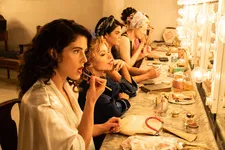 |
| Queen Of The Ring |
In conversation with Eye For Film, Rickards discussed the remarkable real-life figure of Mildred Burke and the film's political and moral grounding. She also reflected on the purpose of art, storytelling and wrestling, and why the latter is magical.
Paul Risker: In the film, Billy uses some choice adjectives to describe the art of wrestling. If you had to choose three or four adjectives to describe acting, what would they be?
Emily Bett Rickards: Honesty, contact, love, and forgiveness.
PR: Okay, why those?
EBR: Well, honesty comes down to finding the character's truth — the truth of why they're saying what they are. It doesn't matter if they're lying to the other character, but why are they honestly doing that? Contact is the connection you make with other people. So, that one is acting or reacting. Love because I think you have to end up loving the character and letting them into your soul and your body. And forgiveness, because everybody makes mistakes and you gotta come from a place of non-judgment when you're accessing whoever your character is, and to be able to think on the fly.
PR: Before playing the part of Mildred Burke, was she someone you were familiar with, and what piqued your interest in taking on this role?
EBR: I didn't know anything about her to begin with, and I thought that was a disservice to me and anybody else who didn't know who she was, because she was an incredible woman. She was a woman stepping outside the norms of her era and I really appreciated that about her. The things that she stood and fought for are those things that we continue to fight for and stand for in our modern-day society. And part of the platform that she started is the one I get to stand on now.
So, not only am I inspired, but I also have complete gratitude for what she did and who she was. I was inspired by this woman who went after a dream against all odds. That's a beautiful thing for all of us to lean into and recognise and feel empowered by, and perhaps do that for ourselves.
PR: I remember talking with an actress who said you can unlock a character through the smallest of details, such as the way they walk. Is this a sentiment you'd share, and how did you unlock the character of Mildred Burke?
EBR: As you go through the journey with a character, they're constantly unlocking you, and you're constantly learning about them because they're constantly growing as well. With Mildred, putting on the muscle was a really big part of finding her spine, because she operated in the world differently than I do.
She walks differently and she holds her shoulders back differently than I do, and that was a part of her persona and her body language. So, when the muscle was built enough, I was able to step into the spine of her character more authentically and find out who she was.
PR: So, this character is a combination of physicality and emotion, but it strikes me this might be true of some of the other characters you've played.
EBR: With Mildred specifically, she was a woman so tied to her physicality, and a part of her physicality made her an outsider. Putting on muscle in that era for women was not in-vogue, and that made her not only stand out, but it also put pressure on certain norms.
It makes her this being and it forms her. And they come in tandem, but what comes first, the chicken or the egg? I don't know — is it the muscle or the personality or the dream? You're not really sure, and I'm not sure one does come first, right? This is who she was, and, specifically with Mildred, the physicality was so emotionally tied to her because her dream was to be liberated in this way — by using her body.
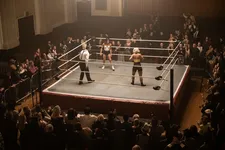 |
| Queen Of The Ring |
We should all yearn for freedom over our own bodies. She took that in stride and that's who she was. So, yeah, the physicality was really tied to her personality, her psychology and her emotions, more so than any other character that I've had the chance to play thus far.
PR: Could we describe Queen of the Ring as political filmmaking?
EBR: There are really strong messages in this film, but I don't think that if someone's reading this article, it should scare away from something that is political because it's an inspiring film. It's a film to learn from and, at the end of the day, it's a film to bring us all together. And I think that our modern-day knee-jerk reaction to politics is dividing us. If we could just come together and talk to each other and be with each other as humans, we would be stronger. And that, I think, is what this movie's true message is.
There are also moral things to stand on here. Mildred believed in fairness, and she believed in having the right to choose. And that is, I guess, in direct conflict with politics, right? That's what we're afraid of — that's what all parties are afraid of [laughs].
We just had our election here in Canada and I know the States went through it as well, but politically it's a charged year and even a charged era. But I would argue that Mildred felt the same.
PR: I find I'm becoming increasingly disillusioned with politics because of its adversarial nature. We desperately need to find some middle ground because it's growing more difficult to have productive conversations.
EBR: I was feeling that too around our election, and I'm sure I'll continue to feel it as the conversations arise. It's always heightened around an election, but I agree with you. I wish there was more of a middle ground and somewhere that we could come together and really look at each other as people and ask each other what we need — not just what kind of power each of us wants.
PR: Queen Of The Ring is a critique of power structures and power dynamics. It's a complex web woven by the characters, but none of these power structures are neat and tidy.
EBR: I don't think it's a neat, tidy structure at all. I think life is messy, and Mildred definitely went with the punches.
PR: Each wrestling match has its own presence and story arcs within a larger narrative. The final match, with Mildred defending the title against June Byers, feels like a dramatic main event of an actual wrestling card, where everything is left, emotionally and physically, in the ring.
EBR: Everything really was left in the ring, and especially that moment for Mildred. If you enjoy the movie and want to know more about her life, the book, Queen Of The Ring: Sex, Muscles, Diamonds by Jeff Leen dives into where her life goes from there.
This was her up; this is where we chose to tell her story, because I think this is how she'd want to be remembered. And this is what was really important. But like I said, life is messy, and she went with the punches.
Like any wrestling match, it's all improvised. People think wrestling is scripted, and, sure it is, but those wrestlers in the ring are improvising on the spot. It's such a cool mix of the grey areas and it's why people can't really understand wrestling unless they've gotten into it because it's happening live. These athletes and storytellers are risking their bodies for entertainment and getting us emotionally involved.
During Mildred's era, a lot of wrestling wasn't scripted because women weren't allowed to wrestle each other, and so, there weren't teammates, right? So, Mildred's story was about bringing women together so that there could be this storytelling in wrestling that we see today.
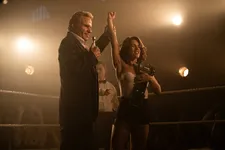 |
| Queen Of The Ring |
The final match, man, it was emotional to film and to end with. It was emotional to feel that for her and be with her on that journey, and it's palpable in the story that we tell.
Once again, thanks to our entire crew, who were just so emotionally involved. We spent three nights shooting that scene and emotions were heightened throughout. It wasn't always like a special emotion. It was a hard emotion, and it was difficult. It was like a life compressed into three nights of shooting, and it was quite something.
PR: Picking up on your point that people can't understand wrestling unless they've gotten into it, for much of its history, the business was protected, and the tradition of kayfabe was honoured. With the explosion of shoot interviews and podcasts, the business is more exposed than ever. There's a scene in the film that captures a snapshot of this tradition, where the heels and baby-faces couldn't be seen arriving at the wrestling venue together.
EBR: It has evolved, and it has become a little bit more glitz and glamour, obviously, and the moves are different. We have these huge arenas, and it's a place where people can come and be emotionally turned on together, like when you go see a movie or go to a play or go to a sports match. But wrestling is different. You're asking the audience to put their emotions in the ring and that's what makes the magic.
PR: Earlier you were speaking about a person's autonomy over their own body, which immediately brings to mind the overturning of Roe vs. Wade. I often think about how progressive victories have to be fought for in retrospect, because society is prone to regress. The history of women's wrestling is an example of this behavioural pattern, although one hopes enough progress has been made in the recent years that such severe regression is unlikely.
EBR: It's funny because it's like we repeat the things we think we've gone through, right? I don't know what it is. Are people afraid to keep moving forward, and so they regress a little bit or go back to an evil that they know? And at the same time, women's wrestling, I hope, is having another highlighted moment. Opposed to having it sink again, I think it should just continue on its journey. Or I should say, I wish it would keep growing and blossom and keep changing. And maybe it does. Maybe it's a two-steps forward kind of thing.
I do know women's wrestling has become more respected, and I would be interested in talking to women wrestlers to see if they think it's equalised. That's not the sense I get right now. I could be wrong — I'm not a female wrestler. There's always going to be the opportunity to grow, at least probably while I'm alive. I don't know how fast these things change. This is my first time, as far as I know, living on Earth [laughs].
PR: Queen Of The Ring is important because it tells the story of a pioneering era in women's wrestling. We should never forget those that have come before us, and so, the film goes beyond entertainment to remember those real life persons who deserve to be remembered.
EBR: It totally goes beyond entertainment. But I also think that we come to entertainment because it's a common ground for us all to connect. So, entertainment is never just entertainment; it's never just fluff. That's where we come together to feel each other's humanity.
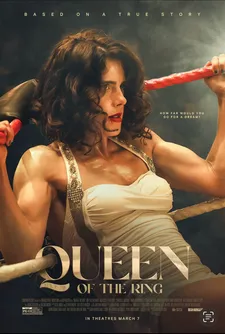 |
| Queen Of The Ring poster |
We could be from two totally different worlds and think we have nothing in common with the character we're watching, and then all of a sudden, we walk away thinking of our own grandmother or our own life or our own family. And we feel so inspired, connected and grateful to that story for teaching us something about ourselves.
Great art teaches us or affects us, to want to go back out into the world and hopefully connect with each other and treat our planet with greater respect.
PR: I've often considered that films start off being about the characters and end up being about the audience. Would you agree?
EBR: Yeah, I think so, and it's like a dance. I go to a movie as an audience member to watch a story and as I'm involved in this other character's story, my nervous system is activated. Maybe my heart becomes a little bit more open, and maybe I get a little bit softer. Maybe I get a little shaken up. Something changes in me that makes me more available in my life, or potentially you watch a movie at night, and you go to sleep, and somehow it transfers into your dreams. Something inspires you, something changes you, something makes you want to call your friend you haven't talked to in three years. That's what I think this is all for.
Queen Of The Ring is now available On Digital in the US and is back in US theatres for Mother's Day.





















